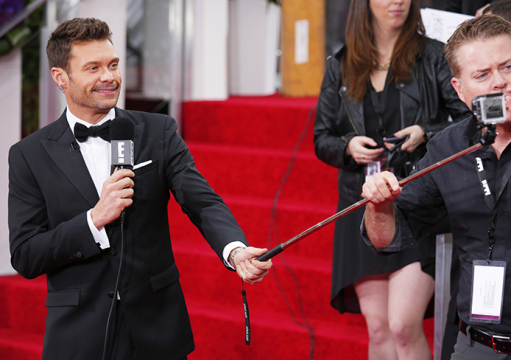
Ryan Seacrest gets his selfie video camera adjusted on the red carpet at the 72nd Annual Golden Globe Awards show at the Beverly Hilton Hotel in Beverly Hills, Calif., on Sunday, Jan. 11, 2015. Credit: Courtesy of TNS.
Maybe the selfie started feeling too selfish — since late 2014, there’s been a sales boom of the “selfie stick,” a handled pole that attaches to a cellphone so more people can fit into the frame of the selfie.
And while it can bring more friends into the picture, it also a sign of millennial tendencies, said Jesse Fox, an assistant professor in the School of Communication.
“It’s a thing that couples and families are using so that they can fit everyone and the full background in their photo without passing their phone off to a stranger,” Fox said. “But it’s definitely cutting down that social interaction of ‘Oh, will you take a photo for us if we take one for you?’ among people.”
Patricia Hosler, a second-year in speech and hearing science who owns a selfie stick, said she only uses it for fun.
“I used it during move-in day this year. I was an OWL, and so I ran around taking pictures of all the other OWLs as they worked. I also brought it to a football game once,” she said.
Hosler said she likes taking selfies, but typically takes them “in the privacy of (her) room.”
“I also don’t mind seeing other people’s selfies, and I think it’s pretty funny to see people taking them in public. You sometimes don’t realize how stupid you can look talking a selfie until you see other people do the same thing,” she said.
Fox’s thoughts on the selfie stick being anti-social also reflect a recent study she did that found men who post more photos of themselves scored higher on scales of narcissism and psychopathy. Her study showed that men who take time to edit their photos scored higher in narcissism and self-objectification.
These findings have exploded across news outlets and become a popular topic of discussion on the Internet, and Fox thinks some sites are sharing the wrong idea.
“This in no way means that men who take more selfies are crazy narcissists. Their scores just showed that they were more likely to exhibit the anti-social behaviors associated with narcissism and psychopathy,” she said.
The study was conducted via an online survey that was given to men ages 18 to 40 with questions about their social media habits and social tendencies.
Fox said there were questions pertaining to how often these men posted selfies online, as well as how often they took time to edit the photos beforehand.
Either way, the findings were no surprise to some Ohio State students.
Ben Fogle, a third-year in political science, said that the findings almost perfectly fit all the men he knows who take selfies.
“Pretty much every guy I’ve met that takes selfies seems pretty full of himself, and almost proud that he posts so many pictures of his face on the Internet,” he said.
Michaelanne Sauer, a third-year in psychology, said many male selfies she sees are taken at the gym.
“It seems like they just want to show everyone how ripped and sweaty they are, and look for attention through that,” she said. “I’m not surprised about the narcissism thing because I have a hard time believing that the selfie guys at the gym genuinely just want to keep people updated about where they are.”
Taking selfies has become common for people around the world, and Fox said it has everything to do with craving affirmation.
“It really comes down to people wanting other people to approve how smart and beautiful and wonderful they are by ‘liking’ their Facebook or Instagram photos,” she said.
Joseph Heath, a first-year in chemical engineering, said he can count on two hands the number of selfies he’s taken, and considers the concept “silly.”
“I think the idea of constantly posting selfies to social media consumes people, and celebrities do it, so everyone else hops on board looking for attention,” he said.


